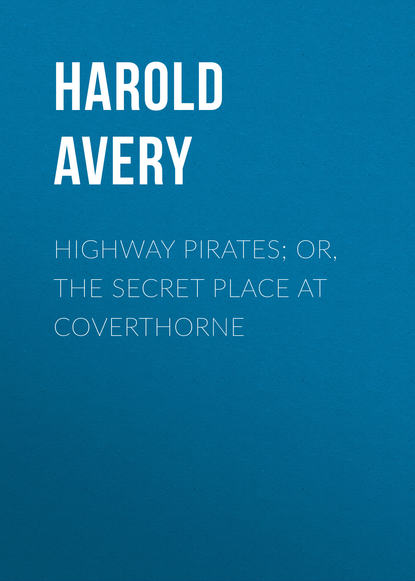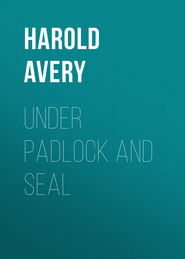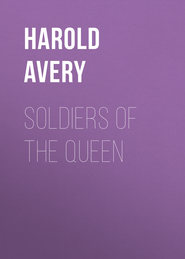По всем вопросам обращайтесь на: info@litportal.ru
(©) 2003-2024.
✖
Highway Pirates; or, The Secret Place at Coverthorne
Настройки чтения
Размер шрифта
Высота строк
Поля
"I wonder where this passage goes?" I said. "Perhaps it's part of a disused mine."
"There never was no mine along here that I know of," answered my companion. "The air seems fresh. The only thing is to go along and see where it leads. Be careful, Master Eden; there may be a nasty drop somewhere."
Slowly and cautiously, in the inky darkness, we crept along, at each step making sure of the ground in front of us before we advanced further. The path appeared to make a very gradual slope upwards. We must have gone quite twenty yards, which, owing to our slow progress, seemed treble that distance, and we were beginning to exult in the thought of speedily obtaining our freedom, when there was an exclamation from George, and the next moment we found ourselves brought up short by a bank of earth which completely blocked the passage. Even in the darkness it was not difficult to realize what had happened.
"The roof has fallen in," said Woodley shortly, but the catch in his voice betrayed his bitter disappointment.
There was no help for it – the tunnel was blocked; and in utter weariness we sat down on the rocky floor to rest.
"Well, we're better off here than where we were last night," said George. "We shouldn't live many more hours down below, for I believe the storm's getting worse."
"I wonder what this passage was for?" I remarked, after a few moments' silence. "D'you suppose the smugglers used it for anything?"
"No," answered George. "If the smugglers made it, then old Lewis would have known of its existence, and he'd have tried to escape this way instead of risking his life in that boat."
"He did say something," I exclaimed, suddenly remembering the last words I had heard from the old salt. "I didn't suppose they had any meaning at the time, for I thought he was drunk. Wait a moment, and I'll tell you exactly what they were. He said, 'You'll find it yourself if you look about. I'm the only one as knows.'"
"Then he must have known," said George, "but he didn't want those convict chaps to find out. Perhaps it's a secret among the 'free traders,' or perhaps it's a fact that the old chap was really the only person who knew. I've heard him say that he was a rare climber when he was younger, and had got to places on the cliffs where no one else had ever been. Well, sir, there's a bit of cheese and two apples wedged in that crack of the rock. I'd better go down and fetch them before the tide rises; they'll at least keep life in us for a couple of days."
Slowly we retraced our steps, taking great care lest we should arrive at the opening of the shaft before we knew where we were, and fall through it on to the platform beneath. With the sea rising, there seemed as small a chance as ever that we should get out of the cave alive; but we were, at all events, spared the terrible fate which that morning had seemed inevitable. Woodley descended to the cavern, and having rolled up the two apples and the cheese in his coat, he made fast the bundle to the end of the rope, and I hauled it up. He was in the act of following, and had nearly reached the mouth of the shaft, when I saw him pause and, hanging on the rope with one hand, take something off a ledge with the other.
"What d'you think I've found?" he said, as he joined me again in the tunnel. "Why, that pistol Rodwood left behind. I put it right up there out of harm's way. The little crevice is dry and sheltered, and a good bit above the reach of the waves, so I don't doubt but what the charge will explode all right if it's fired. It don't seem much good to us at present, but it might come in useful to make a signal and attract attention if we could manage to get to the mouth of the cave and sight a passing ship or boat. There!" he continued, as we once more sat down at the end of the passage, and he unrolled our meagre stores from his coat; "that's all we've got in the world, barring the water that trickles down the rock below, and a bottle of sweet oil I've got in my pocket, which my missis asked me to bring her from the chemist's at Welmington. Poor girl! she's wondering what's become of it, and of me, too, by now, I expect. And the stuff isn't much good to us, I fancy. I wish the bottle had been filled with some of that brandy those rascals wasted; we shall be likely to need something of the sort before long, if we haven't wanted it already."
Although the tunnel was blocked, a cold draught from the cave below seemed to be always blowing through it, every now and again coming in stronger gusts as the storm increased. The darkness was so intense that I already felt it oppressive, and thought that after a time it would become positively unbearable.
"I wonder if the smugglers ever come here now," I said. "They might perhaps know of the place, and use it as a hiding-place for their goods."
With this notion in my mind I went down on my hands and knees, and felt about in order to find anything which might prove that the tunnel had been visited at one time or another by the "free traders." But though I spent some time in groping about in this manner, I picked up nothing but a few fragments of rock. Then I remembered Lewis's words, and how he had distinctly stated that he was "the only one that knows." He had no doubt been led by some accident to discover the shaft and the passage, and had thought fit to keep the knowledge to himself, perhaps intending to make good use of it when any special need should arise for a place of concealment, either for men or "goods."
I sat down again by Woodley, and passing my hand over my clothes to find if they were drying at all, I felt something hard in my inside coat pocket. Wondering vaguely what it could be, I unbuttoned my jacket, and while doing so remembered suddenly the metal tinder-box I had found in the empty desk the day before I left school. I took it out, fumbled with my fingers till I found the flint and steel, and – I suppose for the sake of seeing a ray of light, however tiny and momentary – I struck a spark. I hardly think if I had fired a gun it could have produced a more unexpected effect on Woodley. He sprang to his feet with something like a shout of surprise.
"What's that?" he cried. "A tinder-box! Where did you find it? I made sure Rodwood had taken it with him in his pocket."
"This is another," I answered; "it's one I found at school. The lid fits well, and has kept out the damp, I fancy."
"Bless the boy!" cried George, "why didn't you tell me you had it before? I've been wishing and wishing for one this last hour or more."
"It's precious little good now that you have got it," I replied, handing him the box in the darkness. "We've got nothing to light except the tinder and matches, and that's no practical use."
"Wait a bit," interrupted the guard. "We'll make a lamp. This bottle of oil I've got in my pocket will provide stuff to burn, and a strand of worsted out of one of my socks will make a wick. Hurrah, Master Eden! we'll get a light burning presently, and find out what sort of a place we're in."
"I don't see how you're going to make a lamp," I answered, "unless you hold the oil in the palm of your hand. We've got nothing left – not even that metal cup the men took from poor Tom's flask."
The question was a difficult one to answer. Reduced to the possession of practically nothing but the clothes we wore, it seemed at first impossible to manufacture any implement or vessel, however simple. But necessity is the mother of invention, and certainly the necessity in our case was sufficiently pressing to quicken any inventive faculties we might possess.
After some minutes' thought, and the making of one or two suggestions which had to be abandoned as impracticable, my companion slapped his thigh, exclaiming, —
"I've got it – my old watch!"
With the aid of his knife George managed to remove the works from the old-fashioned turnip-shaped silver case, which was so commonly seen in those days. This formed a sort of cup to hold the oil, which was supplied with a sort of floating wick made of a thread of worsted and a tiny bit of wood, to obtain which we were obliged to descend the iron steps, and bring up the fragment of broken plank from the bottom of the shaft. It was hardly possible that the tiny flame could be kept long alight if exposed to the strong draught which swept through the tunnel; but with a piece of leather cut from the top of his boot, and the big bull's-eye glass of the watch, Woodley managed to fashion a rough but effective shade, and at length the lamp was pronounced ready for use. If we had been a couple of boys about to let off a big sky-rocket, we could hardly have felt more excited as we struck the flint, blew up the spark in the tinder, and ignited first the sulphur match and then the tiny wick. The result was poor enough, but the lamp certainly did burn, giving out perhaps as much light as a modern night-light. To us, however, after having been so long in total darkness, it seemed quite brilliant; and with its aid there was at all events a possibility of our being able to examine our surroundings.
A part of the passage had evidently been cut through the solid rock, but farther along the roof was of earth, and had been propped up with wooden supports. It was owing to the fact that some of these, no doubt rotten with age, had given way, that the fall had occurred which formed the block against which we had been brought up short. We at once proceeded to examine this obstruction, and had hardly turned our light upon it before we made an important discovery. The fall had not been of sufficient volume to quite block the tunnel; there was a narrow opening still at the top of the heap of débris, but not wide enough, as we could see at a glance, to admit of the passage of a human being.
"Hurrah!" cried the guard. "D'you see that, sir? We'll soon scratch a hole there big enough to crawl through, or my name ain't George Woodley."
"I'm afraid if you do it won't be much good," I answered. "If the roof has fallen here, it's almost sure to have fallen again further on in several places, before the tunnel comes to the surface. This shows that no one has been along it for some time."
We turned away, and examined the rest of the passage as far as the top of the shaft; but only one thing did we find, and that was an empty bottle stowed away in a hole in the rock. It was a queer, misshapen old thing, which had, perhaps, held good liquor in its time, but evidently belonged to a by-gone age. Worthless as it might have appeared under ordinary circumstances, to us it proved a valuable find; and George offered at once to go down and fill it with water from the cave below. The discovery and the suggestion were both made none too soon. Another half-hour and it would have been impossible, for both wind and tide were rising; the big waves were already breaking into the entrance of the cavern with a booming roar, and the boiling surf swept clean over the platform just as George was re-ascending the rope.
I was a strong, healthy boy, but the long hours of cold, terror, and semi-starvation were beginning to tell. I felt weak and feverish, my skin was dry and parched, yet the chill from my sodden clothes seemed still to strike right through into my very bones. With the aid of his knife George fashioned the fragment of plank into something resembling a short spade; then scrambling up the bank of earth, he began to dig with the intention of enlarging the existing hole till it should be big enough for us to crawl through. With burning eyes and chattering teeth I stood below, and assisted as best I could by dragging away the loose earth with my hands. What with my deafness, and with the roar of the sea in the cavern below, I could not hear a word he said, though he did not waste much time in talking.
Our fate must have been decided long before this if we had not found means of ascending the shaft to our present position. The storm had increased in fury, and we could tell each time a big wave swept into the cavern, by the rush of air which came whistling up the shaft and swept in a briny blast along the passage. Suddenly George stopped working, and I saw the dark outline of his figure motionless in the feeble ray of the little lamp.
"What's the matter?" I cried.
He made no reply, but raised his hand as a person would in the act of listening. For half a minute he remained in that position, then resumed his digging. In a very short time, however, he stopped again, and after an instant's pause startled me by leaning forward and shouting at the top of his voice through the hole, —
"Hollo, there!"
Receiving apparently no reply to his hail, he turned and beckoned me to climb up by his side.
"Can you hear anything, Master Eden?" he asked.
I listened intently, but no sound caught my ear but the muffled surge and splash of the water in the cavern.
"There!" exclaimed my companion – "there again! Don't you hear it?"
Still to my dulled hearing no fresh sound was audible.
"What was it?" I asked.
Without answering my question, he once more roared, "Hollo, there!" through the widened hole, and remained with warning hand uplifted, as though expecting an answering shout. "Fancy, I suppose," he muttered at length. "Yet that blind fellow heard something of the sort too. Tut! I think I'm going queer in my head."
He went on digging, but once or twice I noticed that he paused in the same curious manner. I was too weary to pay much attention, but continued laboriously scooping and dragging the earth he loosened till my fingers seemed raw. At length Woodley stopped digging, and sat down for a rest. As he moved the lamp the dim oil flame gave me a momentary glimpse of his face, and on it I thought I detected a queer expression which I had never noticed there before.
For ten minutes, perhaps, he sat regaining his breath, and saying nothing; then turning to me he asked abruptly, —
"Master Eden, do you believe there's such things as ghosts?"
"No," I answered blankly, astonished at the question. A terrible thought flashed through my mind that, as a last crowning horror, Woodley was actually going out of his mind. "No," I repeated in a faltering tone, "I don't believe in ghosts."
"Neither do I, then," said George; and picking up his wooden spade, he went on digging.
CHAPTER XVII.
DAYLIGHT AT LAST
How that night passed, or whether it was night or day, I cannot say. Worn out, I must have fallen asleep over my work; and when I awoke, George was shaking my arm and informing me that he had crawled through the hole and found the passage free on the other side. I seemed to be burning hot now; there was a singing in my head, and as I rose to my feet I staggered and almost fell. How many hours George had been at work I had no idea. My notions of time were getting hazy and uncertain; I felt that we had lived in that dark, windy passage for ages.







